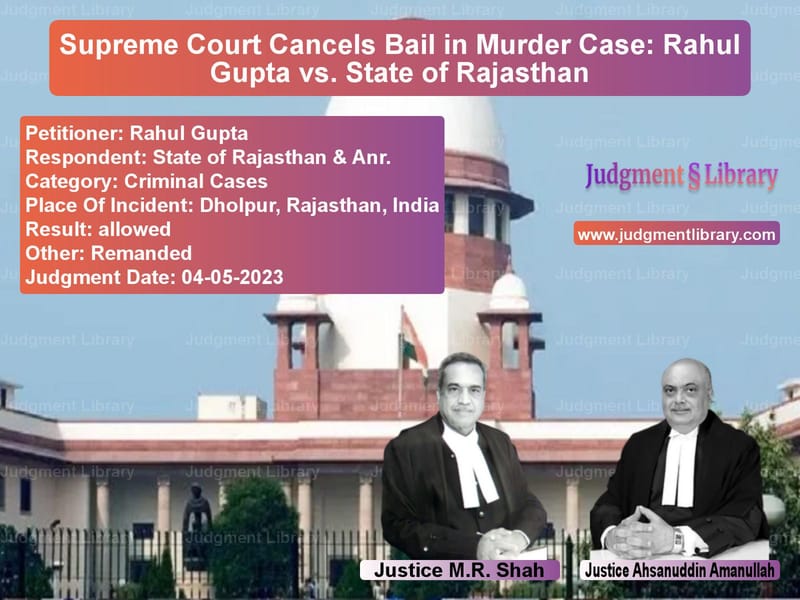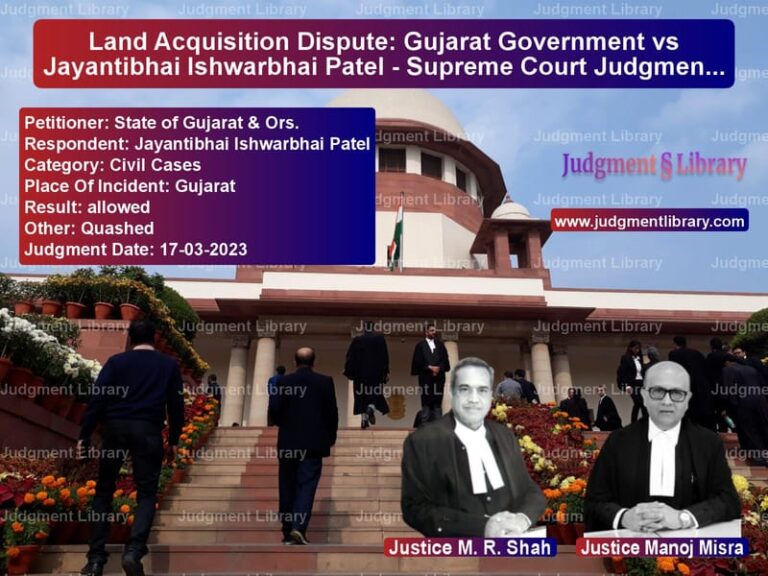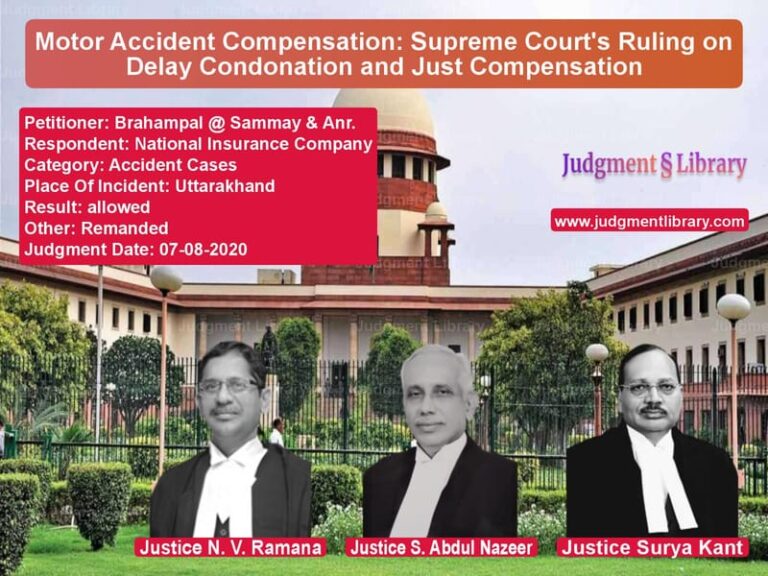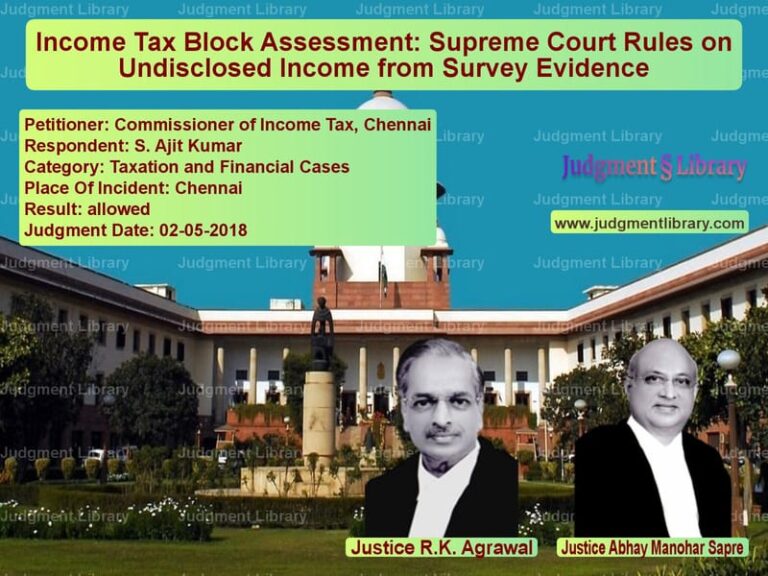Supreme Court Cancels Bail in Murder Case: Rahul Gupta vs. State of Rajasthan
The case of Rahul Gupta vs. State of Rajasthan highlights a critical issue in India’s judicial system—the importance of considering evidence and material collected during investigations before granting bail in serious criminal cases. This Supreme Court ruling sets a precedent by reinforcing the principle that courts must exercise due diligence while evaluating bail applications in cases involving grave offenses like murder.
The dispute in this case arose when the Rajasthan High Court granted bail to the accused in a case of murder (Section 302 IPC) without properly considering the evidence. The Supreme Court was approached by the complainant, arguing that the High Court had failed to take into account the seriousness of the allegations, the material collected during the investigation, and the potential threat to justice. The Supreme Court ultimately quashed the High Court’s order and directed the accused to surrender.
Background of the Case
The case stems from an FIR (No. 474/2021) filed at Police Station Kotwali, District Dholpur, Rajasthan. The accused were charged under Sections 302 (murder), 307 (attempt to murder), 201 (causing disappearance of evidence), and 120-B (criminal conspiracy) of the Indian Penal Code (IPC). After completing the investigation, the police filed a charge sheet confirming the involvement of the accused.
Despite this, the Rajasthan High Court granted bail to the accused on July 18, 2022, without considering the seriousness of the allegations or the charge sheet’s contents. The complainant, feeling aggrieved by this decision, appealed to the Supreme Court.
Petitioners’ Arguments
The complainant, who filed the appeal, made the following arguments:
- The High Court granted bail without taking into account the seriousness of the offense and the material collected during the investigation.
- The accused were charge-sheeted for a grave offense like murder, which necessitates careful judicial scrutiny before bail can be granted.
- The High Court’s order lacked reasoning and was a non-speaking order, failing to provide any justification for granting bail.
- Allowing the accused to remain free on bail posed a threat to justice and could influence the trial proceedings.
Respondents’ Arguments
The accused, in response, argued:
- The case had been pending for a long time, and the trial would take significant time to conclude.
- There was no immediate risk posed by the accused being out on bail.
- One of the accused had a wife suffering from a serious brain hemorrhage, and he needed to take care of her.
- The High Court had properly exercised its discretion in granting bail.
Supreme Court’s Analysis
The Supreme Court closely examined the circumstances under which the Rajasthan High Court granted bail. The Court found that the High Court had issued a one-line order without assessing any evidence. The Supreme Court noted:
“Despite the accused being charge-sheeted for serious offenses under Section 302 IPC, the High Court, without taking into consideration any material forming part of the charge sheet and without considering the seriousness of the offenses, directed their release on bail.”
The Court further emphasized that granting bail in such a casual and arbitrary manner is against established judicial principles.
Importance of Considering Investigative Material
The Supreme Court stated that in cases involving serious criminal charges, courts must carefully examine the material collected during the investigation before deciding on bail applications. The judgment specifically highlighted:
“When the accused are charge-sheeted after the investigation, the High Court ought to have taken note of and/or considered the material collected during the investigation even to find out whether there is any material involving the accused for the serious offense under Section 302 IPC.”
Deficiencies in the High Court’s Order
The Supreme Court found that the High Court’s bail order was a non-speaking order, meaning it did not explain the reasons behind granting bail. The only justification given was that the trial might take a long time to conclude, which the Supreme Court found inadequate. The Court ruled:
“In a case involving an offense under Section 302 IPC, the High Court must consider all relevant factors, including evidence collected during the investigation, before granting bail. A mere statement that the trial may take time is not a valid ground for bail.”
Final Verdict and Directions
After considering all arguments, the Supreme Court:
- Quashed the Rajasthan High Court’s order granting bail.
- Ordered the accused to surrender within 10 days.
- Directed the High Court to reconsider the bail applications afresh by examining the evidence in the charge sheet.
- Allowed the accused to file a separate plea for interim bail on medical grounds, which the High Court must consider independently.
Implications of the Judgment
This judgment is significant for multiple reasons:
- Strengthens due process: Courts must now ensure that all relevant evidence is considered before granting bail in serious offenses.
- Prevents misuse of judicial discretion: The Supreme Court has reinforced that granting bail should not be based on vague justifications.
- Protects victims and witnesses: By revoking bail, the Court has prioritized the safety of witnesses and the integrity of the trial process.
- Sets a precedent: Future cases involving serious crimes like murder will require courts to exercise greater caution in bail decisions.
By delivering a clear and reasoned verdict, the Supreme Court has upheld the principles of justice and due process, ensuring that bail is granted only after thorough judicial scrutiny.
Petitioner Name: Rahul Gupta.Respondent Name: State of Rajasthan & Anr..Judgment By: Justice M.R. Shah, Justice Ahsanuddin Amanullah.Place Of Incident: Dholpur, Rajasthan, India.Judgment Date: 04-05-2023.
Don’t miss out on the full details! Download the complete judgment in PDF format below and gain valuable insights instantly!
Download Judgment: rahul-gupta-vs-state-of-rajasthan-&-supreme-court-of-india-judgment-dated-04-05-2023.pdf
Directly Download Judgment: Directly download this Judgment
See all petitions in Murder Cases
See all petitions in Bail and Anticipatory Bail
See all petitions in Fraud and Forgery
See all petitions in Judgment by Mukeshkumar Rasikbhai Shah
See all petitions in Judgment by Ahsanuddin Amanullah
See all petitions in allowed
See all petitions in Remanded
See all petitions in supreme court of India judgments May 2023
See all petitions in 2023 judgments
See all posts in Criminal Cases Category
See all allowed petitions in Criminal Cases Category
See all Dismissed petitions in Criminal Cases Category
See all partially allowed petitions in Criminal Cases Category







